
 |
|
|
|
|
#1 |
|
Member
Join Date: Dec 2004
Location: Kernersville, NC, USA
Posts: 793
|
Just won this dagger on Ebay. I wanted it badly, and was fortunate. What caught my eye first were the symbols on the scabbard. The face in the sun was a common symbol of the Katipunan. Also the patina of the wood looks very nice, as does the tarnish on the (I hope) silver fittings. A few questions for my friends:
How common is it to have a PI dagger without a guard? Do you think that this one is original, or the shield on the scabbard added later? What is the proper pronunciation for Katipunan? All thoughts, speculation, information, and opinions appreciated!  Steve 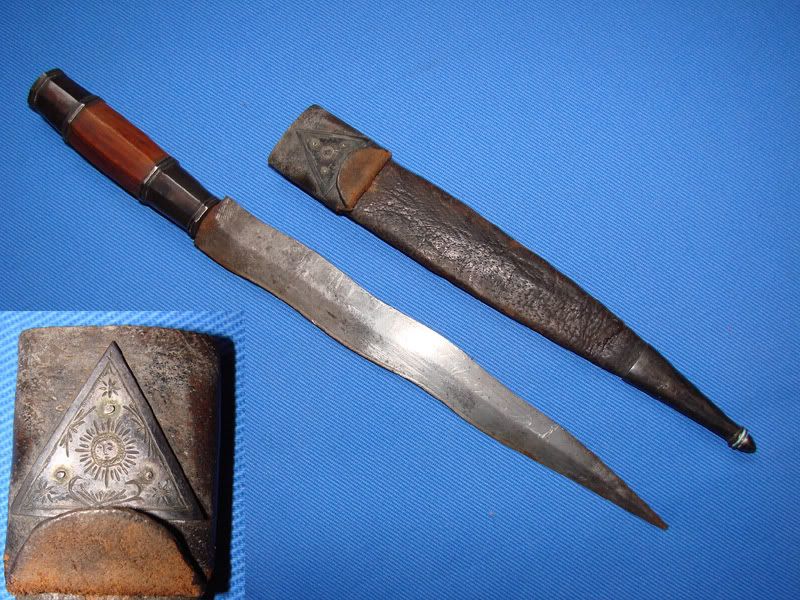 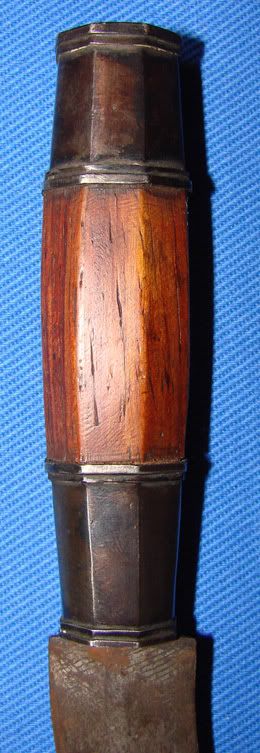 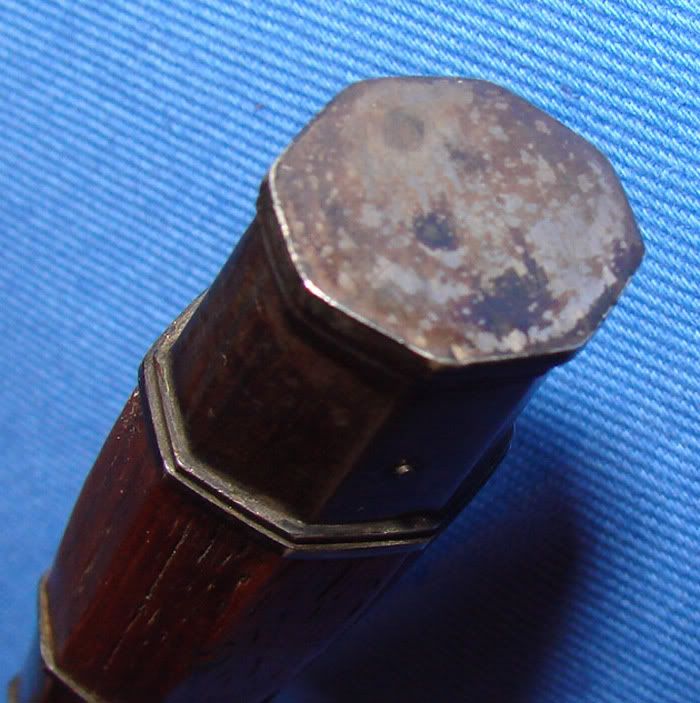 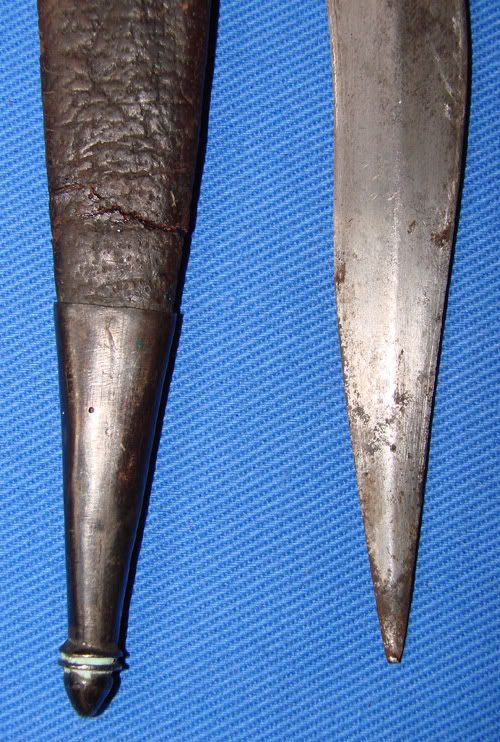 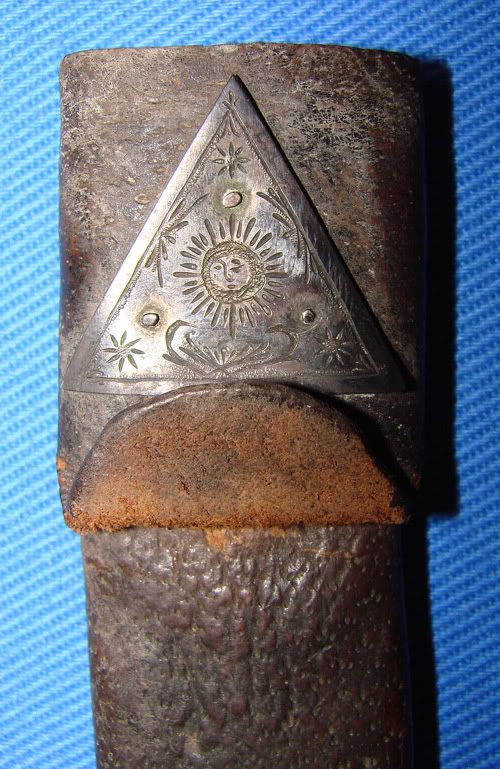
Last edited by Ferguson; 3rd April 2009 at 08:11 PM. Reason: Changed title |
|
|

|
|
|
#2 |
|
EAAF Staff
Join Date: Feb 2005
Location: Centerville, Kansas
Posts: 2,196
|
BEAUTIFUL!!!
 Looks original to me. The fittings do look to be silver but you won't know for sure until it arrives. I only have one dagger in my collection without a guard and think that it did originally have one. I cannot tell by the pictures if there is even room for one on this piece though. If money wasn't so tight right now Looks original to me. The fittings do look to be silver but you won't know for sure until it arrives. I only have one dagger in my collection without a guard and think that it did originally have one. I cannot tell by the pictures if there is even room for one on this piece though. If money wasn't so tight right now  I would have been trying to add this to my own collection. All that I can say is congratulations on a very nice score and that I am very happy that you could add this to yours. I would have been trying to add this to my own collection. All that I can say is congratulations on a very nice score and that I am very happy that you could add this to yours.  Robert |
|
|

|
|
|
#3 |
|
EAAF Staff
Join Date: Dec 2004
Location: Louisville, KY
Posts: 7,229
|
This is not Katipunan but afterwards, 1900-1901, PI Revolutionary forces under the new PI government in Malolos. I think it is Ilocano and does look like it never had the crossguard (unusual). Nice puppy.
|
|
|

|
|
|
#4 |
|
Member
Join Date: Oct 2007
Posts: 2,818
|
Nice piece, they do look like silver fittings too.
One question though, as I know little about these, in the second large image, the diagonal lines, are they indicative of anything on particular? Gav |
|
|

|
|
|
#5 |
|
EAAF Staff
Join Date: Feb 2005
Location: Centerville, Kansas
Posts: 2,196
|
Gav, If you are talking about the lines on the blade right below the hilt they are there because the blade looks to have been made from a file.
Jose, If the triangle had K's in the corners instead of what looks like stars would it then represent the Katipunan? Robert |
|
|

|
|
|
#6 |
|
Member
Join Date: Dec 2004
Location: Kernersville, NC, USA
Posts: 793
|
Thank you gentlemen for your replies. Jose, I'm sure you are correct after further searches on your suggestion of the Malolos government. The triangular symbol with the sun and 3 stars in the corner was part of the flag designed by Aguinaldo in 1898. There's some debate about the exact dimensions and precise colors. Interesting article here http://www.crwflags.com/fotw/flags/ph-hist.html
I was thinking Ilocos Norte, but know so little that I didn't want to presume. I'm reading some Philippine history, but unfortunately don't retain as much as I did when younger.  Again, thank you all. Can't wait to get this one in hand! Steve (flag image and article by Manuel L. Quezon III) |
|
|

|
|
|
#7 | |
|
Member
Join Date: Aug 2008
Posts: 264
|
Very nice piece! Oh your lucky I didnt see this on eBay! It would have been a battle!! hehe
 Quote:
Agreed. The Katipunan was already a dissolved organization when the symbol(Sun face and Stars, inside a triangle) was developed by Aguinaldo. The sun face and stars inside a triangle is designed after the first Philippine flag...which was made in Hong Kong in 1898. To be politically correct, these types of daggers or swords with this symbol should be grouped in with the "1st Republic of the Philippines" aka Aguinaldos government, and not the Katipunan. Although the 3 "K"s were still in use during the Phil-Am War in honor of the Katipunan. The Katipunan lasted from the early 1890s to March 1897...but, I believe I mentioned this before, many soldiers and officers still considered themselves "Katipunan" because they took the oath blood pact...during the Phil-Am War, this blood pact was not used, so many officers and soldiers(who did not participate in the Revolution of 1896) can not say they were part of the Katipunan. Many of the original Katipunan member still considered themselves Katipunan long after the organization dissolved. An authentic stamp from the 1st Republic...note the 3 Ks.  Replica of what the original Philippine Flag looked like:    Note: The Philippine Flag or any flag in regards to the revolution or the war were banned from 1902 up to 1919. The 1st Philippine Flag went in to hidding during this time and it is still a mystery of who has or where the original is located. This is also why they are unsure of the original "blue" color and precisely what the flag looked like. Aguinaldo had many of these replicas made years later...so there are many private collectors and museums who now claim they have the original. Also, Katipunan is pronounced (Ka-tee-poo-nan). After spending some time in this forum, I know around the Philippine weapons collecting circle, all of these artifacts are still mentioned or labeled "Katipunan"...I guess this is still ok since the definition has already manifested itself in to being categorized as such. But if you want to be precise and accurate about it, then you would use the 1st Philippine Republic or any one of the other several names this government went by. 
|
|
|
|

|
|
|
#8 |
|
Member
Join Date: Dec 2004
Location: Kernersville, NC, USA
Posts: 793
|
Outstanding information and pictures! Thank you.
Steve |
|
|

|
 |
|
|